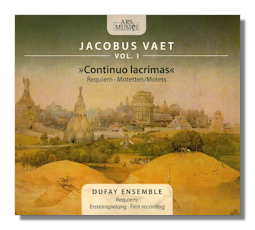
The Internet's Premier Classical Music Source
Related Links
- Motet " Vaet Reviews
- Latest Reviews
- More Reviews
-
By Composer
-
Collections
DVD & Blu-ray
Books
Concert Reviews
Articles/Interviews
Software
Audio
Search Amazon
Recommended Links
Site News
 CD Review
CD Review
Jacobus Vaet

Volume 1 - Continuo Lacrimas
- Missa pro Defunctis
- Motet "Filiae Jerusalem"
- Motet "A solis ortus cardine"
- Motet "Iste est Joannes"
- Motet "Ave maris stella"
- Motet "O quam gloriosum"
- Motet "Continuo lachrimas"
- Motet "Missa Pro Defunctis"
Dufay Ensemble/Eckehard Kiem
Ars Musici 232354
Jacobus Vaet was born around 1529 – in roughly the same decade as Palestrina and Lassus. We know very little about his life and career, except that it was an extremely successful career and that Vaet was very highly regarded by his contemporaries. He was Chief Kapellmeister of Maximilian II, Hapsburg emperor. His output was large… 71 motets, 10 masses, 11 hymns, 8 magnificats and 3 chansons. Unlike others of his generation, his seven volume œvre has been edited to great effect and with outstanding scholarship (by Milton Steinhardt of the Austrian Denkmäler der Tonkunst). This makes it even more surprising and disappointing that Vaet – effectively the last in the great Franco-Flemish tradition of choral composers – still does not occupy the place in performing and recording circles that he could, and should. This, Volume I in a series on Ars Musici, seems as though it might help to bring Vaet to a wider audience, and one which will surely appreciate the beauty and sophistication of his music. It is the first complete CD devoted entirely to Vaet's music; unsurprisingly, it contains a première recording.
That's the Requiem, or Missa pro Defunctis, which occupies the last dozen tracks of this CD, which in all lasts for fewer than 54 minutes. Never mind. The singing is of very high quality: unassuming, gentle, fluid and circumspect, without being either cautious or introspective as such. It's a style of singing that breathes respect and admiration for the gentle and delicate lines of melody which Vaet spins. The same is true of the six motets which come first on the CD. Each is a work of great grace and humility. Nothing bombastic or extrovert. But nor do the musical ideas in any way flinch from their texts or the liturgical forces which underpin them. Just that Vaet sees no need to be over-demonstrative. And the eight-strong Dufay Ensemble, led by Eckehard Kiem works in the same vein. The gorgeous Ave maris stella [tr.4], for example, has all the gentility and apparent simplicity of a lullaby. Yet its very restraint makes does as much to convey the wonder and awe which this text communicates.
On the other hand, this is not whispered or in any way "under-performed" music. The Ensemble's articulation is clear and expressive. Each syllable is audible and comprehensible, wherever the polyphonic line so intends. The absence of the Dies Irae from the Requiem, what's more, is due to regional variations, not a wish on Vaet's part to eschew the tempestuous. In common with many of the other works here presented, compositionally, the movements are built on a cantus firmus. He used the "parody" technique whereby music of existing self-standing compositions is quoted to form the substance of the elaborated mass. Hence the selection of motets here.
One is left at the end of the Requiem, though, with a feeling of great peace, not anger or pain. Somehow the careful and sensitive approach of the Dufay Ensemble (which was formed in 1990 in Freiburg) gets right to the emotional center of Vaet's music and performs it with the same quiet confidence and justified containment as if the composer were as well known as his more illustrative contemporaries.
The booklet that comes with the single-CD "Digipak' comes a useful background essay in German, English and French; and the texts of each of the works – in the original Latin but with translations to German only. The acoustic is appropriately atmospheric. All in all this does the Dufay Ensemble and Ars Musici great credit. If you know of Vaet and/or want to experience idiomatic and persuasive accounts of this important composer, this first volume in a series of his works can be safely recommended.
Copyright © 2010, Mark Sealey.





















